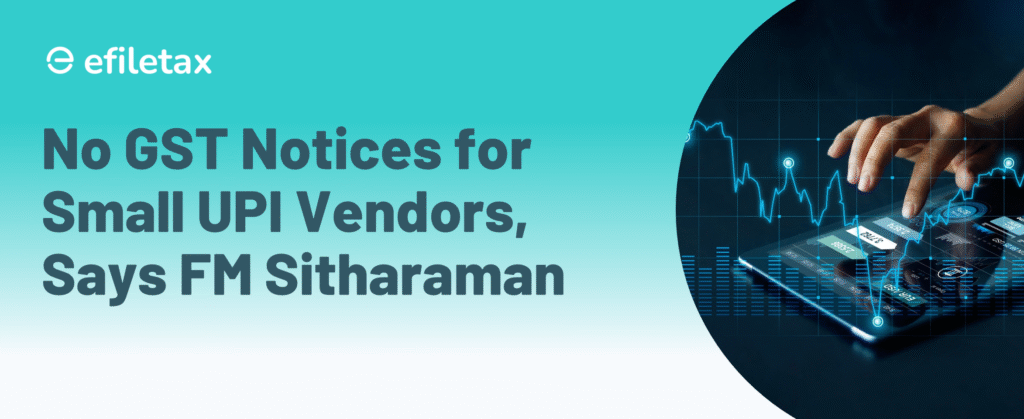
No GST Notices to Small Vendors Based on UPI: What It Really Means
Finance Minister Nirmala Sitharaman has confirmed that no GST notices are being sent to small vendors solely on the basis of UPI transactions.
Let’s break down the issue, clarify what’s true, and what Indian small businesses should actually watch out for.
What Did the FM Actually Say?
- Statement by FM: No GST notices are being sent just because a vendor is receiving money via UPI.
- Target Audience: Small vendors, street hawkers, and small retail shop owners.
Key Clarifications from FM’s Statement
| Issue | Clarification |
|---|---|
| UPI Transactions | Not used alone as the basis for GST enforcement |
| GST Notices | Issued only after proper risk analysis and turnover checks |
| Applicability | Vendors with turnover below ₹20 lakh (normal states) or ₹10 lakh (NE & special states) are not liable to register for GST |
| Cashless Transactions | Encouraged by Govt; not a trigger for harassment |
| Field Officers | Advised not to send notices purely based on UPI data |
Why This Matters for Small Businesses
Keyphrase: GST notices to small vendors
UPI has become the default mode of business for lakhs of small vendors across India. But many of them feared that higher digital transactions might attract unwanted attention from tax authorities. FM’s clarification provides crucial reassurance:
- Small vendors should focus on business growth without fear of digital payments.
What Are the Actual GST Thresholds?
| Business Location | Threshold for GST Registration |
|---|---|
| Normal Category States | ₹20 lakh aggregate turnover |
| Special Category States (NE, Hill States) | ₹10 lakh aggregate turnover |
Note: Aggregate turnover includes all taxable, exempt and export supplies (on PAN India basis), but excludes inward supplies under RCM.
When Can GST Notices Be Sent?
FM’s clarification doesn’t mean small businesses are immune from all scrutiny.
- Suppressed turnover beyond exemption limits
- Bogus invoicing or fake ITC claims
- Mismatch between bank transactions and GSTR-3B/1 filings
- Business run in someone else’s name (benami setups)
Expert Tip: Keep Basic Records Anyway
Even if you’re under the threshold, it’s smart to:
- Maintain a simple tally of daily sales (cash or digital)
- Keep UPI receipts backed by small invoice entries
- Avoid accepting payments in others’ accounts
- Regularly check PAN-linked bank statements for clarity
Legal Source & Govt Clarification
- Statement by FM Nirmala Sitharaman – August 2025, press interaction
- CBIC Instruction to field officers on non-coercive use of data analytics
- GST Registration Threshold – CBIC Notification No. 10/2019-Central Tax
Summary
Finance Minister confirms that no GST notices are being issued to small vendors just for UPI transactions. Only businesses crossing threshold turnover limits are liable to register for GST. Digital payments won’t lead to automatic tax notices.
FAQs
Q1. I’m a kirana shop owner with ₹12 lakh turnover via UPI. Do I need GST registration?
A: No, unless you cross ₹20 lakh in a financial year (or ₹10 lakh in NE/special states).
Q2. Can GST officers track my UPI data?
A: Technically yes, but action is taken only if supported by turnover proof or mismatched returns.
Q3. Should I stop using UPI for fear of notices?
A: Not at all. FM has clearly stated UPI use is not a trigger for GST enforcement.
Final Word: Digital is Safe – But Stay Informed
The government is promoting digital payments, not punishing them. As long as your business stays within the GST threshold and your transactions are clean, you’re safe. For any GST registration or tax help, Efiletax is here to support small business owners like you.